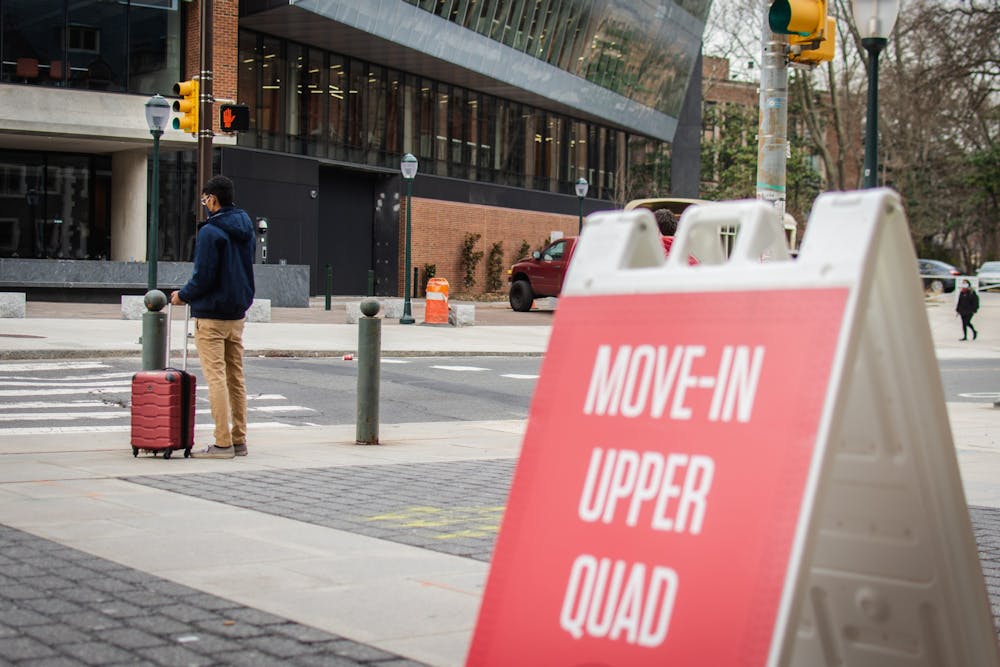Many first-generation and low-income students were forced to make last-minute arrangements after Penn denied their early-move-in requests, following the University’s decision to postpone spring 2022 move-in by one week.
Penn administrators announced in December that the first classes of the spring semester will be conducted online through Jan. 24, citing the spread of the COVID-19 Omicron variant. On-campus move-in — which was previously scheduled to begin on Jan. 8 — was pushed back by a week to Jan. 15.
After the University's announcement, Penn First Plus posted information about requesting financial assistance for costs associated with required travel changes, personal support, and early move-in on its website. Students requested to return to campus early through the MyHomeAtPenn website and requests were reviewed on a rolling basis starting Jan. 5, according to P1P.
The University received over 1,100 requests for early arrival, and approved "slightly more than 60%," according to a written statement to the DP from Marc Lo, executive director of P1P.
Lo wrote that priority was given to certain students who had non-negotiable athletic or academic commitments — primarily Nursing students who have in-person clinical courses. He added that students whose situation indicated that they were in "greater danger physically or psychologically" if they could not return earlier were also prioritized.
In the statement, Lo cited the University's increasing positivity rate as the reason why the University limited the number of students who could return to campus prior to Jan. 15. During the week of Dec. 26 to Jan 1, the campus-wide positivity rate was 14.65%, and the 537 positive cases were the highest number of new cases in one week.
Students who were denied early move-in received an email from Penn Residential Services that said that Penn could reimburse students for costs associated with changes in itinerary or arrange alternate transportation to Penn for Jan. 15 or later. Alternate transportation requests must be submitted by Jan. 13 and reimbursement requests must be made by Jan. 30 at 11:59 p.m.
Some students who identify as first-generation or low-income felt blindsided by the University's sudden decision and from being denied their early move-in requests.
RELATED:
Penn announces COVID-19 mitigation efforts including double mask requirement, gateway testing
Penn moves classes online for first two weeks of spring semester, delays campus move-in
College first-year Mika Castillo, who identifies as FGLI and was denied their early arrival request, said that starting the semester at home was not an option for them. They said that not only was their train ticket nonrefundable, but that they also shared a bedroom with their younger siblings, creating an environment unsuitable for learning.
Castillo added that they had a work-study job at Biotech Commons which they had to return to campus for. They said that because Penn denied their request to return to campus early, they decided to rent an Airbnb with a friend close to campus so they would be able to go back to work.
College senior Laura Dees, who identifies as FGLI, echoed Castillo's sentiments, saying that she was frustrated with the abruptness of Penn's decision-making.
"I have to plan things like my winter break tickets months in advance. I bought my tickets in October because that's when they were affordable for me," Dees said. "And then [I] have Penn pull the rug out from under me the last week of December."
Danielle Egharevba, a Wharton senior who identifies as FGLI, said that she felt helpless seeing her fellow FGLI students struggle to find housing, so she created a Google Form connecting students who were in need of temporary housing to those who could offer a space for students to stay for a short time.
Egharevba said that she got the idea to create the form after talking to her roommate with whom she shares an off-campus apartment at Penn.
"I wish [my roommate and I] were in Philly because we would totally help people out, but neither of us were going back," she said. "I knew some people that were going back early and lived off campus and so they would be able to host people, so I came up with the idea of at least connecting people."
Students also felt that the tone of the email notifying them that they were denied early arrival was "insensitive." One line in the email in particular garnered some negative reactions from students.
"Due to the volume of requests and short window for review, we are unable to respond to your specific requests or consider appeals," the Review Board wrote in the email. "However, we do believe that given the innate talents of our undergraduates, you will be able to reschedule or rearrange whatever might keep you from remaining with family and friends for an additional, short week."
Dees said that she was taken aback by the wording of the email notifying students of their denied early arrival request.
"When I got the email, I actually kind of laughed out loud because I was like 'Whoa, who sat down and wrote this "let them eat cake" type of email?'" Dees said.
Castillo added that the tone of the email was not empathetic towards FGLI students and did not seem to take their situations seriously.
"It just felt very insensitive to specifically first-generation, low-income students who sent their requests because they can't change their plans. And it's not just a matter of 'Oh, you're smart. Figure it out,'" Castillo said. "We're in the situation where we need to request to come back early."









